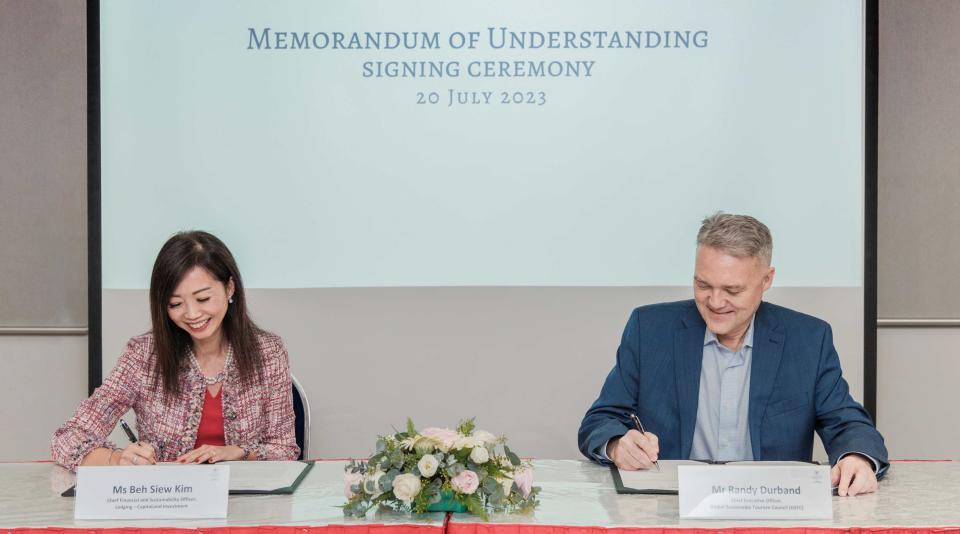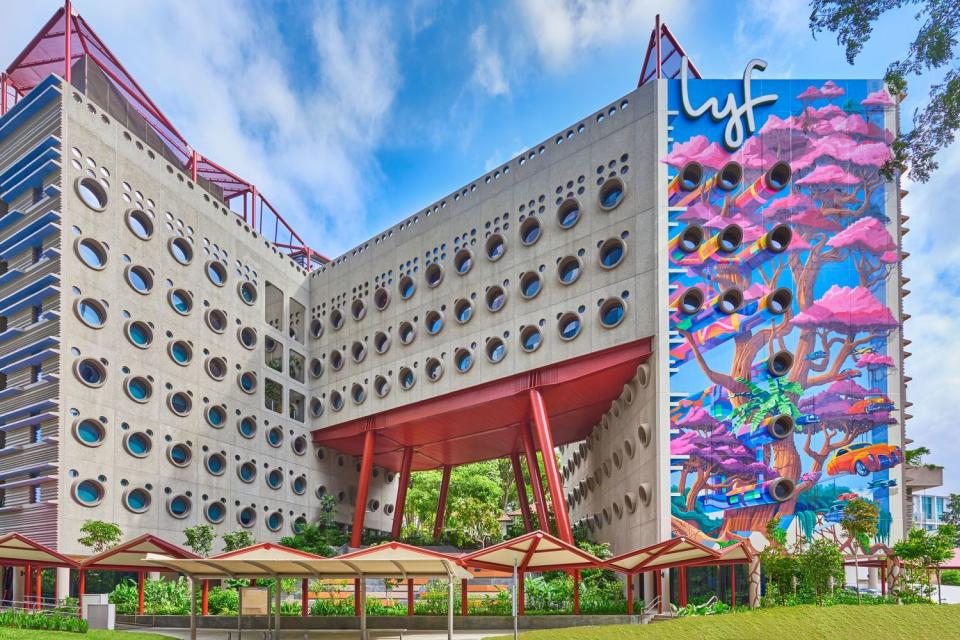Ascott signs MOU with UN-formed body to train hospitality staff in sustainability starting October

The partnership with the Global Sustainable Tourism Council (GSTC) is expected to facilitate over 700 training hours.
The Ascott Limited (Ascott), a lodging business unit wholly owned by CapitaLand Investment, has signed a memorandum of understanding (MOU) with the Washington-headquartered Global Sustainable Tourism Council (GSTC) to jointly train Singapore’s hospitality staff in sustainability matters.
The partnership is expected to facilitate over 700 training hours through new programmes starting in October, the companies announced on July 20.
GSTC manages sustainability guidelines for policymakers, hotels and tour operators, known as the GSTC Criteria. Formed in 2007 by the United Nations, the non-governmental organisation also provides international accreditation for sustainable tourism certification bodies.
The MOU sets the stage for two GSTC programmes: the Sustainable Tourism Course (STC) and the Sustainable Hotel Course (SHC).
Come October, the Ascott Centre for Excellence (ACE) at Anthony Road will host the in-person STC, funded by Workforce Singapore’s (WSG) Industry Catalyst Programme. According to Ascott, the three-day course will equip trainees with a deeper understanding of environmental tools and techniques to address sustainability gaps, regulations and guidelines.
Meanwhile, the SHC will be customised by ACE for hotel and accommodation professionals, and will contain online and self-study components. Set to begin in November, the SHC will provide practical insights into sustainability practices for hotels and will feature expert tips for various departments.
Food and beverage staff in hotels, for example, can learn about the “tremendous cost savings” from reducing food waste, says Randy Durband, chief executive officer of GSTC. “That doesn’t cost any investment. It’s just procedural learning, and it doesn’t negatively influence satisfaction.”
Staff training is essential for operating a hotel more sustainably and for eventually seeking external review and a certification mark, says Durband, a travel and tourism veteran who has led GSTC since 2014. “We are impressed that Ascott is committed to continuous improvement in sustainable practices in all their properties and that they recognise the need to extend and facilitate this training for the broader industry. As such, we’re pleased that they chose to base the training on the GSTC Criteria as a pathway to holistic sustainability.”
Beh Siew Kim, chief financial and sustainability officer, lodging at CapitaLand Investment, says Ascott is well-placed to contribute to capability-building in the industry through this collaboration. “Our extended partnership with GSTC marks an important milestone for us in our sustainability journey. We are committed to help bridge some of the gaps and challenges that the industry is facing around sustainability by empowering future leaders with the right skills and capabilities in an evolving sustainability landscape in line with the GSTC framework.”
The MOU signing took place during the ACE Learning Festival in Singapore, organised as part of the SkillsFuture Festival, which runs from July 4 to Aug 18.
Ascott was conferred GSTC-Recognised Standard status in November 2022 for adopting the GSTC Industry Criteria, which are organised around four main themes: effective sustainability planning, maximising social and economic benefits for the local community, enhancing cultural heritage and reducing negative impacts to the environment.
The Singapore Hotel Association (SHA) and the Singapore Tourism Board (STB) launched in March 2022 the country’s hotel sustainability roadmap, which targets for 60% of all hotel room stock in Singapore to receive internationally-recognised sustainability certifications by 2025.
The roadmap’s other aim is for hotels here to begin measuring their emissions by 2023 and reduce emissions by 2030, with a view to achieve net-zero emissions by 2050.
Ascott targets for all of its managed properties to become GSTC-Certified by 2028, announced the hospitality group in November 2022 at the launch of the Ascott CARES framework. Ascott says its sustainability framework is aligned with CapitaLand’s 2030 sustainability master plan — which was updated in June with elevated targets like cutting Scope 1 and 2 carbon emissions by 46% by 2030.
At the MOU signing, Ascott announced that two of its properties are now GSTC-Certified: Lyf one-north Singapore and Somerset Greenways Chennai in India.

According to Ascott, efforts are underway for more properties to be fully certified. In Singapore, over 95% of accommodation units across Ascott’s managed properties are slated to be GSTC-Certified by 2024.
Travellers are increasingly mindful of hotels’ sustainability initiatives, says Beh, who was CEO of the manager of CapitaLand Ascott Trust (CLAS) from May 2017 to July 2022. Hotels that fail to meet guests’ expectations on sustainability could lose “a big part of their corporate business”, she adds. “[Looking at] the revenue from both the leisure and corporate sides, it’s very clear that guests want it. If you’re not in it, you may be out of the game. It’s not about costs anymore; the way I look at it, sustainability is for survival, for you to stay in business. If people still look at it as a cost [issue], they’re getting it all wrong.”
Photos: The Ascott Limited
See Also:
Click here to stay updated with the Latest Business & Investment News in Singapore
DBS favours industrial, retail S-REITs this 'red-hot summer' as high rates erode DPU
Coldplay, Taylor Swift's concerts a possible 1.5% FY2024 DPU lift for hospitality REITs: CGS-CIMB
CapitaLand Ascott Trust’s manager to focus on DPS, not AUM growth
Get in-depth insights from our expert contributors, and dive into financial and economic trends

 Yahoo Finance
Yahoo Finance 